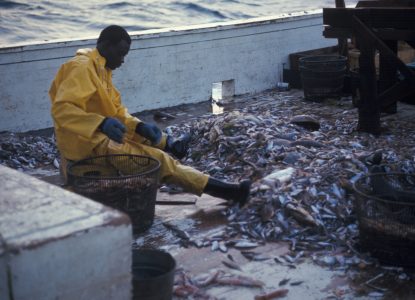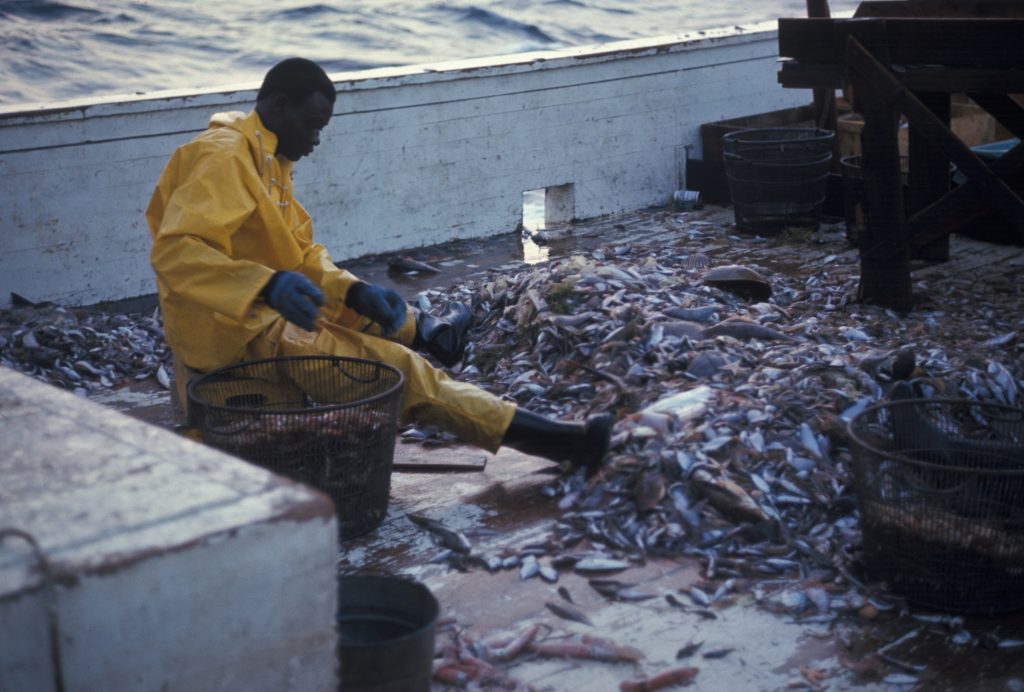By JoAnne Wadsworth, Communications Consultant, G20 Interfaith Forum.
– – –
On March 27th, 2025, the G20 Interfaith Forum, in partnership with Praeveni Global, hosted the first webinar in a monthly series commemorating the 25th anniversary of the Palermo Protocol, which will lead up to the G20 in South Africa in November. The webinar’s panel included Fr. Bruno Ciceri, a Scalabrinian missionary who spent decades caring for migrants and seafarers and was the former International Director for Stella Maris; Dr. Jess Sparks, an assistant professor at Tufts University who researches working conditions in seafood supply chains; Dornnapha Sukkree (referred to as Donner), co-founder and executive director of MAST Human, which combats human trafficking and advocates for victims; and Fr. Walter Gabriel, a Scalabrinian missionary with a PhD in sociology who has worked with migrants in various countries. The webinar was moderated by Duncan Jepson, Director of Strategy and Operations at Praeveni Global.
Introduction
Duncan Jepson opened the webinar by explaining its focus on the fishing industry, noting that it’s one of the most pervasive industries involving both land and sea. He mentioned this was the first in a series of webinars leading up to the G20 in South Africa in November, hosted by the G20 Interfaith Forum along with Praeveni, an organization focusing on preventing modern slavery.
Jepson introduced the four panelists who have dedicated their lives to fishing industry workers and to their faith. He explained that the webinar would be conducted as a conversation rather than a series of presentations and began by asking Dr. Jessica Sparks to explain the experiences of fishers working in the industry.
Dr. Jess Sparks
Dr. Sparks began by explaining that working conditions in the fishing industry exist on a spectrum. At one end is decent work with equitable wages and benefits, while at the other extreme is forced labor, including human trafficking, debt bondage, and violence. She noted that many conditions fall in the middle – not reaching the threshold of forced labor but certainly not qualifying as decent work.
She described how fishing vessels often have crews of diverse nationalities, creating communication challenges that can lead to conflict and serve as a control mechanism. Dr. Sparks also highlighted inequitable wages, with Filipino fishers in the UK receiving substantially less pay than others for the same work.
“When we talk about working conditions, we conceptualize them on a spectrum. At the really good end, we have what we call decent work… and at the extreme end, we have forced labor, which would include human trafficking.”
Dornnapha Sukkree
Donner described her firsthand experience with fishers in Southeast Asia, highlighting various abuses such as long work hours, lack of training, and occupational hazards. She noted that many fishers suffer injuries, including amputations, and some cannot even swim despite working at sea.
She emphasized that physical abuse is common in the fishing industry, with captains using violence to maintain order. The isolation at sea presents a particularly serious problem as fishers cannot seek help or contact their families.
“The isolated condition is the most worrisome for fishers, because it’s all sea and they cannot seek help. They cannot contact someone at home… We had 11 persons who said they lost contact with their family for 27 years.”
Fr. Bruno Ciceri
Fr. Bruno confirmed that the exploitation of fishers is a global issue, not limited to specific regions or vessel flags. He explained that fishers face long work hours leading to fatigue and occupational accidents, as well as isolation that can last for years at sea.
He noted that fishing vessels can remain at fishing grounds for up to three years, with officers rotating but migrant fishers staying for the entire period. Fr. Bruno also highlighted how fishing companies cut costs by reducing fishers’ wages since they cannot save on fuel or vessel maintenance.
“No Wi-Fi, no wife, so that means they are completely isolated… We thought that this phenomenon of exploitation of fishers was limited to Asia, but actually in Europe, especially Scotland and Ireland, we have many cases of fishermen that have been exploited.”
Fr. Walter Gabriel
Fr. Gabriel emphasized that human trafficking is a crime and stressed four key issues: debt bondage, where fishers are recruited with promises of good wages but end up trapped in debt; physical abuse; non-payment of wages with captains withholding pay under false pretenses; and passport confiscation.
He highlighted that illegal, unreported, and unregulated fishing is often connected to exploitative labor practices. Fr. Gabriel also noted the importance of religious presence for families of fishers, providing emotional support and explaining complex issues of human trafficking in simple, understandable terms.
“Human trafficking is a crime, it’s evil, and the primary root causes are economic vulnerability and poverty. When the fishers come from low-income backgrounds with limited job opportunities, forcing them into high-risk jobs for survival, this vulnerability is easily exploited.”
Historical Context and Structural Issues
The panel discussed how the fishing industry’s exploitation has historical roots. Dr. Sparks shared findings from her archival research showing that migrant workers were recruited in the English and Scottish fishing industry as far back as the 1860s under “apprenticeship” schemes that allowed for lower pay.
Fr. Bruno explained that as fishing work became less appealing to locals due to intensive labor and low pay, companies began importing migrant workers. He noted that while technology has improved certain aspects, much of the work still requires manual labor, and when schools of fish are found, workers must continue fishing regardless of hours.
The panel also addressed structural vulnerabilities that make fishers susceptible to exploitation: poverty and lack of alternatives in their home countries, deceptive recruitment practices often by people known to them, and isolation at sea where “the skipper is god.”
Technology and Prevention
Donner explained how her organization developed an app to help fishers maintain contact with their families and send distress signals. The app uses minimal data and can store messages to send when connectivity becomes available. It also provides location tracking and can alert authorities in emergency situations.
Fr. Bruno described the vulnerability cycle where families go deeper into poverty when remittances don’t arrive, often not knowing where their loved ones are or how to help them. Legal cases against recruiters are rarely pursued due to the time and complexity involved.
The panel discussed the crucial role of faith in providing solace to both fishers and their families. Religious organizations like Stella Maris offer practical support and spiritual comfort, while temples and churches serve as community centers where workers can seek assistance.
Conclusion
The webinar concluded with recommendations for prevention. Dr. Sparks advocated for investment in fisher organizations so workers can make collective demands and enforce their rights rather than relying solely on government inspectors. She emphasized the need to understand wage structures and prevent retaliation against those who speak up.
Donner stressed the importance of worker empowerment and leveraging technology to help fishers. She noted that while there is significant investment in technology to track fish, less attention is paid to tracking and protecting the people who catch them.
Duncan Jepson thanked the participants and mentioned that the next webinar would focus on corporate governance.
— —
JoAnne Wadsworth is a Communications Consultant for the G20 Interfaith Forum Association and Editor of the Viewpoints Blog.



